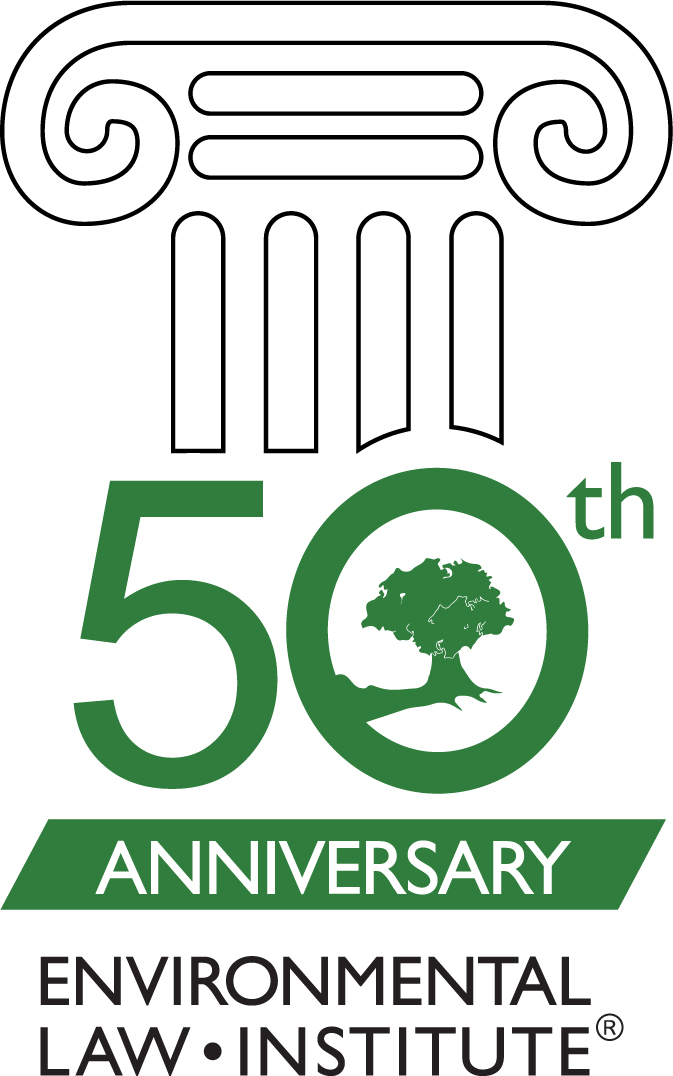50-year celebrations typically feature nostalgic reminiscings about a great run, as with golden wedding anniversaries, or a gauzy look back at a humble beginning for a now-mature organization.
The Environmental Law Institute’s 50th year celebration is different.
Yes, ELI can and should be nostalgic. Its founders were prescient. They knew that the nascent environmental movement’s kinetic energy would not be enough. The movement needed to be firmly grounded in the rule of law if it was to take root and flower. Lawyers, judges, and legislators, with ELI’s support, laid that foundation with our bedrock environmental laws and regulations—the Clean Air Act, the Clean Water Act, and the Toxic Substances Control Act. They helped add more building blocks through the years. In the 1980s and 1990s, for example, Congress enacted Superfund to clean up the Love Canals scattered over our landscapes, and the Oil Pollution Act to fill a yawning gap in the law exposed by the Exxon Valdez disaster.
But by the turn of the century, the upward trajectory in environmental law and policy began to flatten out. Surficial signs of environmental progress, including visibly cleaner air and water, made environmental issues seem less urgent. Companies understood the need to avoid reputation-damaging, tightly-crafted environmental liabilities and, by and large, they did. Congress stopped passing environmental laws.

Fast forward to now and we see a much different picture in ELI’s 50th anniversary year. Environmental law is on the move, and ELI’s role in the field is more important than ever. Lawyers, judges, and legislators are again on the front lines.
The reasons are many. Climate change is a principal one. We already are experiencing significant impacts on the environment from climate change, and more disruption is on its way. Rising and acidifying oceans, debilitating heat, and extreme weather events are profoundly impacting human, animal and plant behaviors, and, in some cases, their collective ability to survive in rapidly changing ecosystems.
But while climate impacts are the disturbing result, it is the human-based causes of climate change that calls environmental lawyers to the ramparts. In particular, with our fossil fuel-based energy sector generating the majority of destructive greenhouse gas emissions, we somehow must transition the entire sector to cleaner energy sources and uses, and quickly. This inserts environmental lawyers directly into the energy sector—an essential foundation of our economy. Indeed, climate change is requiring environmental lawyers to be energy lawyers, and vice versa. How else can we navigate profound shifts in how we produce and regulate energy and energy-related emissions for our massive electricity, industrial, and transportation sectors?
Deforestation and other land use practices trigger additional carbon and other heat-trapping emissions, generating additional worries, as well as potential opportunities to employ nature to enhance the uptake of carbon in our forests and soils. Lawyers will have to be in the middle of that, too.
In addition to climate change, there are new environmental threats that face ELI and its phalanx of lawyers, judges, and legislators. We are learning that many forms of pollution are more prevalent, and harm human health more severely—particularly for disadvantaged communities and the most vulnerable among us—than we had realized. Lead, particulates, and so-called forever PFAS chemicals are examples.
Competition for resources also is increasing, leading to more global, regional, and local conflicts. The world is shrinking, triggering conflicts between major industrial projects, the protection of watersheds and ecosystems that support wilderness values, recreational interests, indigenous rights, and others.
For all of these reasons, as it did 50 years ago, ELI must again take a fresh look at our legal systems and evaluate new approaches that will effectively address the new environmental challenges that we face. Thankfully, throughout its 50 years, ELI never lost focus on its primary mission to “make law work for people, places, and the planet.” We need ELI’s wisdom and competence now, more than ever.
